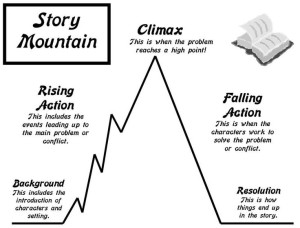Precious Patterns

A few days ago I finished reading Don’t Let’s Go to the Dogs Tonight, a memoir about a family and a general situation that were both indeed going to the dogs. With the author’s mother sinking into alcoholism and mental illness on top of accumulating family tragedies and the disappearance of the social order they’d always known, I figured the accelerating spiral of events would take these poor folks right down the drain. But actually Alexandra Fuller’s account ended with life simply going on. Yes, her family’s circumstances were diminished. What they’d lost would be lost forever. But they never crashed and burned, either. They still participated in the ongoing adventure of life, with the spirit to appreciate it.
They were not down for the count. By that point, I doubted they ever would be.
So that’s a triumph, of sorts—perhaps the only kind of triumph the real world usually allows.
And yet, as a reader I wanted to see a specific defining moment when they emerged from the darkness. I don’t recall that there was one.
There’s probably a lesson for me in this. A memoir tells the story of a segment of life, and (memoir or fiction) I expect a story to have a denouement that definitively wraps it up. Depending on that final resolution, it’s either a triumph over the odds (like this one) or else it’s a tragedy (like this). I begin to suspect I’ve been trying to force a binary construction on a non-binary world.
I recall my determination and belief, back in the early 90s, that the campaign to save my son Joseph from lifelong disability would reach a clear end point. Anticipating that end—that triumph, mind you (this was not going to be a tragedy)—I’d begun the first draft of a memoir. It explored our motivations. It dramatized the resistance we encountered and the encouraging progress we saw. But now time had passed. Anticipated developments were occurring less frequently. Progress on the manuscript was actually catching up to events. From a narrative point of view, the time had arrived to see the payoff.
Also, we’d also reached a similar juncture in our own lives. We could not indefinitely maintain the same frenetic pace that had prevailed since Joseph’s first year. All my will power was directed to wrapping things up, after which, you know, we would begin enjoying normal life. True, I no longer had anything resembling a clear plan for how to do that (previous plans having pretty much run their course). But we were going to achieve that happily-ever-after, simply because no other outcome made sense to me.
In both Alexandra Fuller’s story and my own, I was looking for a certain pattern. In both, my expectations were defeated.
Nate Silver (founder of the FiveThirtyEight website) has written that it’s human nature to look for patterns in the world. That’s how we make sense of experience. That’s how we interpret data and make predictions and choose courses of action. In literature, that’s how the hero of a story tackles challenges.
Anyone who has been exposed to a lot of stories (and who hasn’t?) has learned to look for a pattern something like this:

Subconsciously, perhaps, we suppose such a pattern exists, not only in carefully constructed literary works by Tolstoy or Hemingway but also in our own personal adventures.
Mr. Silver warns, however, that our instinct often leads us to find patterns where none are present. He says we’re “terribly selective” about the information we notice and react to. There are far more data points than we can comfortably absorb, so we oversimplify—we ignore evidence that doesn’t fit the pattern we want to see—as if doing so will make that other evidence go away. Then we’re surprised when reality fails to deliver a dramatic denouement, and happily-ever-after never quite occurs.
Well, my story does have a resolution of sorts, albeit painful, messy, and nothing like my expectation. I perceived a conclusion, tied a bow on the manuscript, and pronounced it an honest rendering of what had happened. But then: Life kept right on occurring. Some of the new developments were wonderful, some less so. Reflexively looking for patterns, I saw new ways WATB could have been rendered, as well as material for brand-new story arcs.
Rather than attempting to write another story, however, I seem to have been trying to get a handle on the problem created by these unreliable insights.
It’s natural to look for a pattern. Having found one, we then tend to use it as a basis for thinking we’ve got something figured out (a very comforting sensation). This in turn can lead to arrogance and impatience (believing we’re right, we become indignant when experience doesn’t confirm that) and even intolerance for alternative views (instead of willingness to consider additional information that might invalidate our precious pattern).
For example, I recall feeling very dismissive toward well-meaning people who tried to say my expectations for Joseph might not be realistic. Dammit, he needed to recover from his very significant developmental problems! I knew that. And I believed, based on experience and every cultural truth I’d absorbed while growing up, that problems could be overcome. They were supposed to be overcome. I might’ve been willing to debate methods and tactics but not the feasibility or worthiness of the overall objective.
I still do not think it was wrong to dedicate myself to the cause of optimizing Joseph’s chances in life. I wish, however, our dedication did not result in his mom and me becoming so alienated from potential resources. I knew then—and subsequent observations have proved it many times over—that even acclaimed experts know less than is generally supposed. They too rely on imperfect patterns, sometimes with disastrous results. The prospect of proving them wrong just added extra incentive to the motivation I already had. Nevertheless, in this matter, they probably knew more than we did. The experience of trying to help Joseph did not have to be as costly for my family as it was.
Looking around today, I see an awful lot of the same needless inflexibility and reliance on simplified interpretations that marked our greatest struggle. It worries me a lot. But then I think of how the people in Alexandra Fuller’s story, and my own, continue to muddle along despite unwise choices, heartbreaking setbacks, and unalterable circumstances.
I’m thinking that is just part of the human condition.